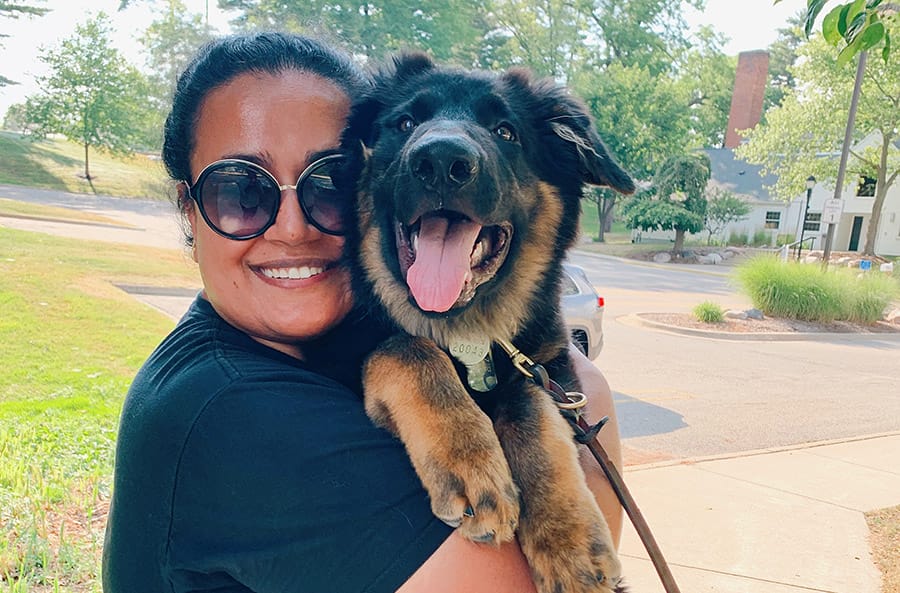
Hey Everyone! My name is Anu, I’m from Southeast Michigan and I’ve been a volunteer puppy raiser for Leader Dogs since 2014.
I grew up in Rochester and like most people within the area had heard of Leader Dogs for the Blind. I couldn’t have imagined that as a young adult I would get involved with the organization and enjoy being a raiser for them, but what started off as something fun to do with my mom quickly evolved into a life-changing experience.
The community at Leader Dog has changed my life. Each of the individuals I’ve met through my experiences has provided me with a safe and nurturing environment to grow, learn and eventually become the person that I am today.
I hope to share with you a bit about myself and give some insight on how puppy raising has become an important part of my life. And if you have any questions or would just like to say hi please feel free to do so in the comments. I would love to interact and connect with all of you today!
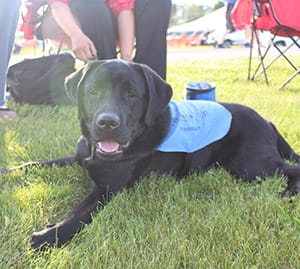
In late 2014 after meeting a puppy raiser on a hot air balloon ride my mom decided that she wanted to apply to be a puppy raiser.
I was SO happy. I’ve been obsessed with animals for as long as I can remember, and I absolutely adore puppies so it sounded like a win-win for me!
My mom submitted her application, and about 2 weeks later we brought home a chubby black Labrador with the sweetest disposition. My brother named him Duke (still slightly salty that he got to name our first Future Leader Dog, but I’m sure I’ll recover at some point).
Duke was the kind of puppy who made things easy on us. He was food motivated, always happy to work, and had the kind of happy energy that labs are known for. He also opened up a whole new world for us, we met our puppy counselors (Kevin, Michelle, Sandy, and Gary you all are AMAZING and we are so thankful for you) who guided us through exactly what we should expect for the next year, and helped us with any problems as we ran into them.
We also met our fellow puppy raisers. They were people who knew how hard it was some days to stay calm when your puppy was, well “being a puppy.” They also understood the glorious highs that came with seeing our puppies accomplish a skill they had been working on for ages. They became the people we leaned on and laughed with, and quickly went from acquaintances we would see once a month at class to friends that we were happy to spend time with.
We quickly learned that being a puppy raiser was a community effort and that you were never alone along the journey.
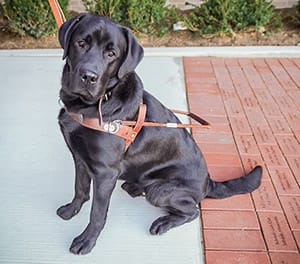
In September 2015 we returned Duke to Leader Dog so he could begin the next phase of his career.
One question I get asked frequently is if it’s hard to return the puppies we raise.
Spoiler Alert: It’s hard.
It’s almost impossible to walk away from the puppy that’s lived with you for a year. My heart breaks every time knowing that saying bye to them as they walk through the door to their new kennel that it’s possibly the last time I will see them. You can’t avoid that pain.
But I take a deep amount of comfort in knowing that the puppies I raise are well cared for and finally doing what they were bred to do. That there is the possibility that the puppy I loved so deeply is going to change someone’s life. That they will help another person gain the independent mobility that I take for granted every day.
Duke didn’t end up making it as a guide dog, he was career changed during his 12th week of training. And while he wasn’t cut out for guide work, he was picked up by another organization and went on to become a service dog for a veteran.
He ended up exactly where he was supposed to be. He did what he was bred to do, he changed someone’s life and gave them the gift of independence.
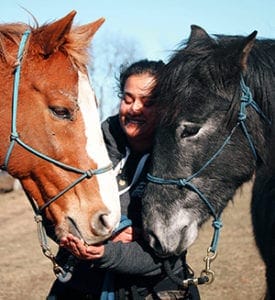
Prior to being a puppy raiser the majority of my experience working with animals was through horses. For the past 25 years I’ve been involved in riding, working, and training horses. Being an equestrian is something I consider a defining trait of my life, and I owe a lot of who I am to the horses who were kind enough to teach me.
I was a troubled teenager and was headed down a path that I’m sure would have ended up in me hurting myself or someone else but being involved with horses changed the trajectory of my life.
Horses, with their kind eyes, took me in day by day and gave me the space to heal. Their strong shoulders carried me through the end of friendships, heartbreak, and so many disappointments I hadn’t prepared for. On their back the world opened up to me. I traveled to places I never thought I’d see, met so many kindred spirits, and found the woman I am today.
Horses saved me.
And years later they’re still here. Guiding me through this world with their quiet kind presence and forever keeping me humble.
To the horses that built me, I would be lost if you hadn’t found me.
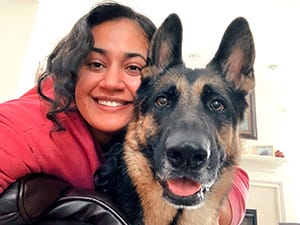
From 2016 to 2017 my mom raised two more puppies for Leader Dog. Inej, a sweet female German shepherd, and Kai, an affectionate yellow lab.
I wasn’t around much for Inej while my mom raised her. I had moved to Florida to pursue some of my riding ambitions. It was hard to be away from home and I was always a little sad that I didn’t get a chance to watch her grow up or experience any of her puppyhood. Every couple of months my mom would visit me, and she would bring Inej with her. For a weekend Inej would get to be a farm dog, helping me care for the horse, and prowling the fenced-in property more than happy to alert us if she saw anything suspicious.
In the end Inej decided that being a guide dog wasn’t for her, and was career changed. I can’t say we were too disappointed because we ended up adopting her as a family pet.
With Kai I was there for everything. Having moved back home I jumped right back into co-raising with my mom. Kai was an easy puppy and always made us look good while working in public. He had a wrinkly face and soulful eyes that melted just about everyone’s heart. We had high hopes for him and his chances at becoming a working guide.
Unfortunately, Kai decided that guide work wasn’t for him either and was career changed, and he was adopted by a wonderful family.
At this point my mom and I were a little discouraged about our ability to raise a successful guide, we were zero for three. While we loved seeing other puppies in our group graduate, it was hard not to wonder if we would ever get to enjoy the experience of raising a graduate.
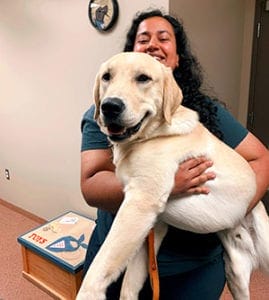
2018 saw us bringing home our 4th Future Leader Dog, Patrón, a golden retriever and Labrador cross.
Patrón wasn’t like any of the puppies we had raised before. He was bursting with energy, an athlete, and so smart that we had to constantly be thinking 4 or 5 steps ahead of him. As challenging as he could be at times, he was perfect while wearing his jacket and working in public. He was only ever focused on myself or my mom, excelled at obedience, and there was something so resilient about him. He never wavered; not when he was confused or even scared. Instead, he would look to us and gather his persistence to keep going.
We returned Patrón for training in early 2019, hopeful that he would become a guide but also very aware that there was a high possibility he wouldn’t. Days turned into weeks, weeks turned into months, and we slowly started to feel a bit more hopeful that he would be matched. We got the news later that fall.
Patrón had been matched with a client and had officially become a Leader Dog.
As a family we were elated and so proud of him. We were also so thankful for the instructors that worked with him and gave him every opportunity to succeed, and even more so for the community that helped as we raised him.
Patrón taught us that puppy raising isn’t a solo endeavor. There are so many hands that touch the dogs who graduate and go on to work, and every graduate is a testament to the love, time, and commitment that goes into raising these amazing dogs.
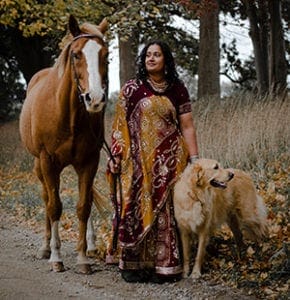
I’ve talked a bit about how horses have shaped my life, and Achates, my first horse deserves the most credit for making sure I became a kind and compassion adult.
He’s an off-the-track thoroughbred who I brought home 12 years ago. Since then he’s been my companion in almost everything. From trying different training methods, to moving across the country, he’s been everywhere and done everything I’ve asked of him.
Achates showed me that there is nothing kindness and time can’t fix. That hard work beats talent. That I didn’t need to be born special to do amazing things, I just had to be brave enough to try. That my heart might break but I’ll always be able to put it back together. That there was so much courage inside of me just waiting to be let out. That it was ok to dream in big and bold strokes.
He gave me wide open skies, and quiet mornings where I could exist without the pressures of the world. And he gave me the will, tenacity, and desire to get up and work hard. To this day he’s still teaching me how to be a better person and there’s nothing I crave more than hearing him greet me as I walk out to see him.
He’s the horse that built me, and I wouldn’t be where I am today without his quiet guidance.
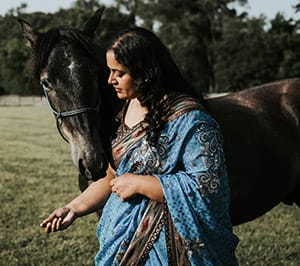
2017 had me meeting my next equine partner, Basilio.
He was a beautiful Andalusian colt that I met at 5 days old. He was onyx colored and looking at him felt like staring into a bright beam of light. Pure, powerful, and potent. At our first meeting his gaze fixed on me, locking in tightly, as he marched towards me so confident. His muzzle met my palm, two puzzle pieces clicking together, and it unfurled the hope that I had for our future together.
Watching Basilio grow up over the past 3 and half years has been such a joy. His curiosity and exuberance while exploring the world have a way of making me feel lighter and more optimistic.
This summer I am planning on starting his riding career and I am so excited to see where this new journey takes us. He’s a horse that is filled with limitless potential, and I’m forever impressed by his willingness to try anything I ask of him.
Our journey together is still very much at its beginning. There is so much left to learn and so many ways that we will grow together, and I honestly can’t wait to see what comes next.
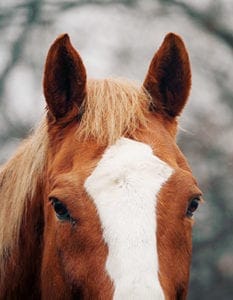
Volunteering at Leader Dog showed me exactly how impactful organizations can be on the communities they work within, and inadvertently prepared me for the job I have today.
This past October I accepted a position at Detroit Horse Power as a Program Associate. It’s been one of the most rewarding jobs I’ve had, combining my love of horses as well as my passion of making sure the sport is accessible to anyone and everyone.
Detroit Horse Power exists to impact youth and community through the power of horses. This mission uniquely addresses two persistent problems facing the Motor City: the shortage of opportunities for metro Detroit’s vulnerable populations (especially children) and the abundance of vacant land. Through riding and caring for horses in a safe and enriching space, program participants learn valuable skills that set them up for future success.
Looking to the future Detroit Horse Power is planning an urban equestrian center. This facility, built on repurposed vacant land, will contribute to the city’s renewal and be a center for community events and equestrian services.
Much like Leader Dogs for the Blind, Detroit Horse Power is committed to impacting the lives in their community in a way that promotes equity and independence, and that’s a mission I’m proud to be a part of.
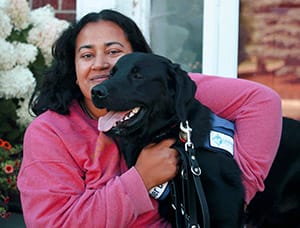
Last week our family got the news that puppy number 5, Bowman, had made it through training and is going to be matched with a client as a guide. Needless to say, my mom and I were overjoyed, two dogs in a row graduating?! This was madness in the best possible way.
Bowman was such a joy to raise. With his large paddle paws, giant ears, and earnest expression he quickly found his way into our hearts. He knew how to charm everyone he met and was always happy to work whenever his jacket was on.
I’m going to miss him deeply. The little grunts he’d make when he wanted cuddles, how nothing could ever get him down, and his infectious happiness that radiated throughout our house. We’re so proud of you Bowman, and grateful that you shared your light with us for a bit.
Go be great and enjoy every second of sharing your large heart with the world.
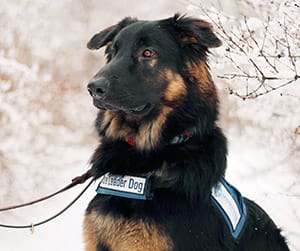
In May, in the midst of a pandemic, we brought puppy number 6 home.
Azir, is a male German shepherd who is probably the most affectionate puppy you’ll ever meet. He’s large, so fluffy, and his ears decided that coming up just wasn’t for them. He loves to be cuddled, sitting by our feet while we’re in the kitchen, and is about as loyal as they come. In case you couldn’t tell I really love this puppy, and I’m hopeful for what the future holds for him.
There are no guarantees when puppies return to Leader Dog to finish their training. Guide work is something that the dogs have to choose for themselves, it’s not anything we can convince them to pursue. As puppy raisers we do our best to stack the odds in their favor, but ultimately it’s up to them.
Azir will most likely return to Leader Dogs in the summer and the choice will be up to him. I’ve got my fingers crossed that he’ll choose to be a guide dog and that he’ll get matched with a client who is perfect for him. Until then we’ll keep giving him the skills he needs to succeed and nurturing his confidence so he’s ready for everything that comes next.
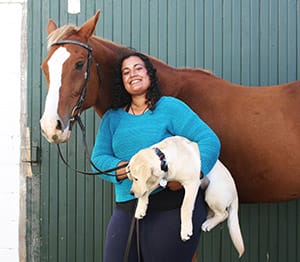
I hope that by sharing a bit about myself and my experience as a puppy raiser I’ve given you a bit of insight on how uplifting it is to be a part of the Leader Dog community. Equity and inclusion are paramount in the world that we live in today, and there’s no reason why each and every one of us shouldn’t have a seat at the table and be adequately represented in the world around us. Leader Dog is a part of making sure that vision comes to life, and it’s a mission that I’m proud to be a part of.
A HUGE thank you to Leader Dog for allowing and encouraging me to share my story, it’s not often that we’re given a platform to share what moves us and I’m grateful I got the chance to do so today.

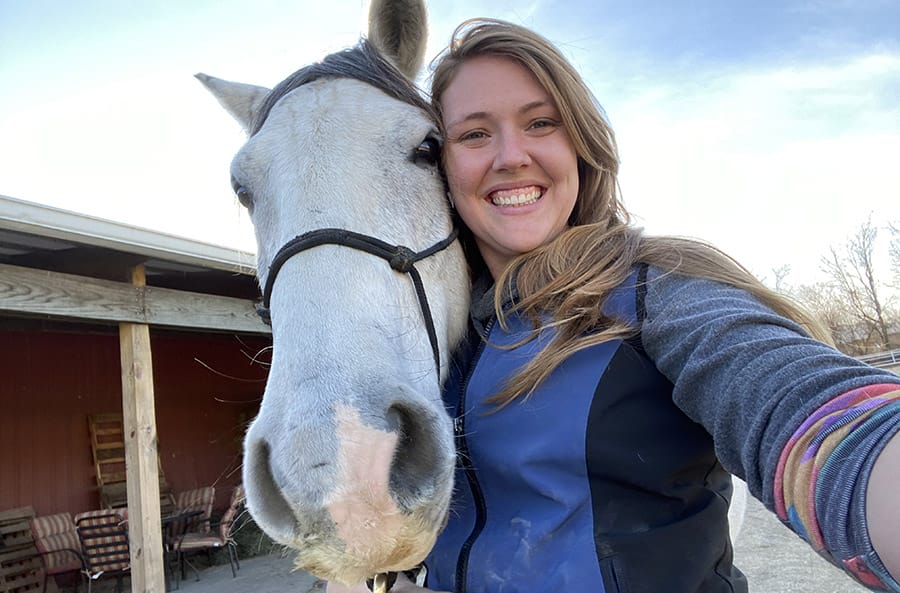
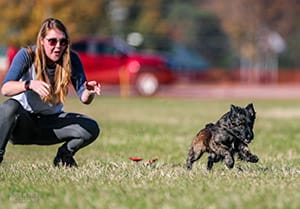 I have spent countless hours studying dogs—body language, listening to behaviorists, taking courses, attending seminars and practicing hands-on for thousands of hours. Lately though, I have challenged myself to use those skills for a different type of learner: a 1,000-lb prey animal. A horse.
I have spent countless hours studying dogs—body language, listening to behaviorists, taking courses, attending seminars and practicing hands-on for thousands of hours. Lately though, I have challenged myself to use those skills for a different type of learner: a 1,000-lb prey animal. A horse.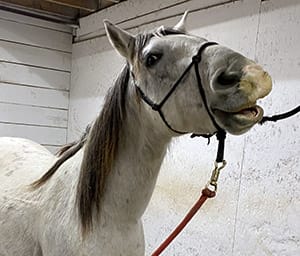
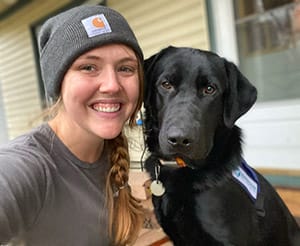 I UNDERSTAND! I watch Courtney and Unico and I am amazed. It looks like magic and I don’t understand how I will ever get there. And I want to be hard on myself and get frustrated.
I UNDERSTAND! I watch Courtney and Unico and I am amazed. It looks like magic and I don’t understand how I will ever get there. And I want to be hard on myself and get frustrated.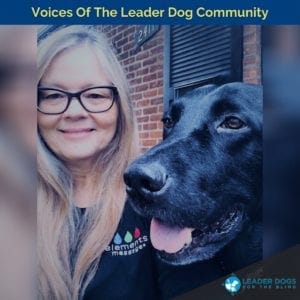 “What I wish for 2021 is that we all hang on tight and remain hopeful for a bright New Year that is just around the corner.”
“What I wish for 2021 is that we all hang on tight and remain hopeful for a bright New Year that is just around the corner.”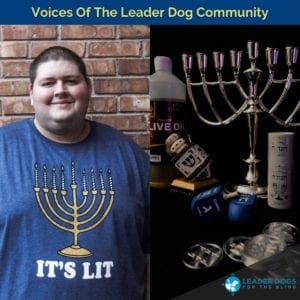 Maccabim returned to rededicate the desecrated Holy Temple, they found only one day’s worth of pure oil for the daily Menorah lighting. That small amount of oil burned for eight days. Chanukah celebrates the moral victory in a triumphant struggle over religious freedom. On Chanukah, Jewish families light the Chanukiah (eight-branched lamp used for Chanukah) for eight nights, adding a light each night until all are lit. Special prayers are said, and it is customary to eat oily foods including oil-drenched potato latkes or deep-fried jelly doughnuts (sufganiyot). Each year on Chanukah, my family sing songs and play joyous music.
Maccabim returned to rededicate the desecrated Holy Temple, they found only one day’s worth of pure oil for the daily Menorah lighting. That small amount of oil burned for eight days. Chanukah celebrates the moral victory in a triumphant struggle over religious freedom. On Chanukah, Jewish families light the Chanukiah (eight-branched lamp used for Chanukah) for eight nights, adding a light each night until all are lit. Special prayers are said, and it is customary to eat oily foods including oil-drenched potato latkes or deep-fried jelly doughnuts (sufganiyot). Each year on Chanukah, my family sing songs and play joyous music.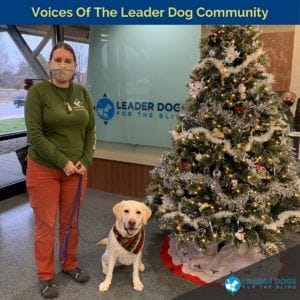 “Someone asked me if dogs would mind if we all were wearing masks and what kind of training they needed to get used to things changing around them. Not once this year has any dog or puppy stopped to question why the world has changed, they’ve still given us unconditional love every day. Especially those days when we needed their comfort the most.
“Someone asked me if dogs would mind if we all were wearing masks and what kind of training they needed to get used to things changing around them. Not once this year has any dog or puppy stopped to question why the world has changed, they’ve still given us unconditional love every day. Especially those days when we needed their comfort the most.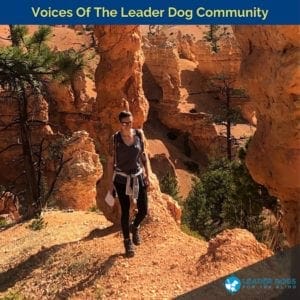 “In 2021, I’d love to be able to travel and feel comfortable doing it. 2020 was the first time in several years that I wasn’t able to go on an annual backpacking trip. I typically don’t travel much, but once a year I was able to see a new part of the country and disconnect from everyday life in a way that’s unlike going on a vacation where you stay in a hotel and still have access to a TV, wifi, restaurants, etc. I love Michigan, but there are plenty of other places with amazing natural beauty that I still want to experience. Right now, even if the spread of COVID-19 was much less severe an issue, it wouldn’t feel responsible to me to travel simply for pleasure. Especially when so many people would love to travel a much smaller distance just to see a loved one.
“In 2021, I’d love to be able to travel and feel comfortable doing it. 2020 was the first time in several years that I wasn’t able to go on an annual backpacking trip. I typically don’t travel much, but once a year I was able to see a new part of the country and disconnect from everyday life in a way that’s unlike going on a vacation where you stay in a hotel and still have access to a TV, wifi, restaurants, etc. I love Michigan, but there are plenty of other places with amazing natural beauty that I still want to experience. Right now, even if the spread of COVID-19 was much less severe an issue, it wouldn’t feel responsible to me to travel simply for pleasure. Especially when so many people would love to travel a much smaller distance just to see a loved one.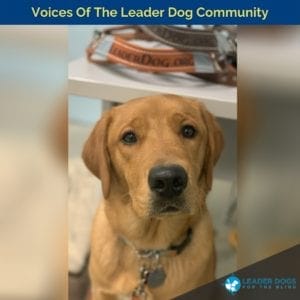 “We hope that Legacy, puppy #20,000, finds his purpose in 2021– hopefully as a Leader Dog! He has made the pandemic a much more light-hearted experience with his goofy personality, and we hope that he goes on to provide his goofiness to a Leader Dog client. He is nearing ten months old and we can’t believe he has been with us this long! He loves to carry around his toys, practice obedience, and put on his puppy coat to go out and work.
“We hope that Legacy, puppy #20,000, finds his purpose in 2021– hopefully as a Leader Dog! He has made the pandemic a much more light-hearted experience with his goofy personality, and we hope that he goes on to provide his goofiness to a Leader Dog client. He is nearing ten months old and we can’t believe he has been with us this long! He loves to carry around his toys, practice obedience, and put on his puppy coat to go out and work.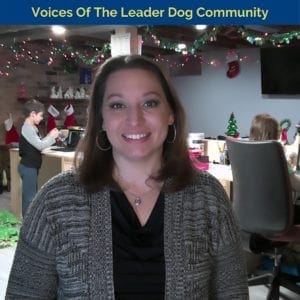 My coworkers have also been very entertained during video conference meetings by the antics going on in the background… my kids spinning in their chairs, bouncing around for gym class or singing for music class, teachers on Zoom constantly telling kids to mute themselves or to turn their cameras back on, and curious kids suddenly appearing over my shoulder.
My coworkers have also been very entertained during video conference meetings by the antics going on in the background… my kids spinning in their chairs, bouncing around for gym class or singing for music class, teachers on Zoom constantly telling kids to mute themselves or to turn their cameras back on, and curious kids suddenly appearing over my shoulder.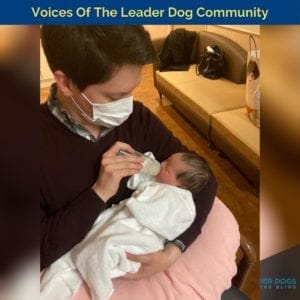 “I hope that in 2021 I will be able to see my new granddaughter who was born in Tokyo last week. It might be another 9 to 12 months due to the Covid virus risk, but it will be worth the wait.
“I hope that in 2021 I will be able to see my new granddaughter who was born in Tokyo last week. It might be another 9 to 12 months due to the Covid virus risk, but it will be worth the wait.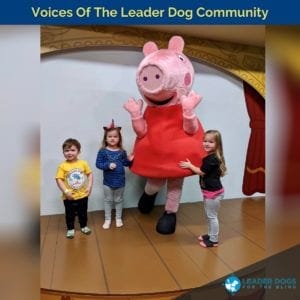 I wish for a real happy hour, in person at a bar and not via Zoom! I wish to be waited on and cleaned up after, I wish for loud music so that I can’t even hear what my husband or friends are saying, but it doesn’t matter because they are there in person and we can just laugh at each other and dance.
I wish for a real happy hour, in person at a bar and not via Zoom! I wish to be waited on and cleaned up after, I wish for loud music so that I can’t even hear what my husband or friends are saying, but it doesn’t matter because they are there in person and we can just laugh at each other and dance.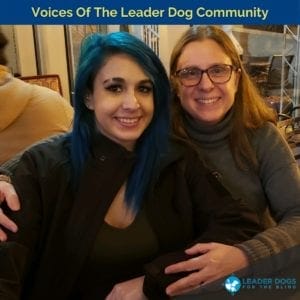 “What I wish for in 2021… To give my oldest daughter a huge hug when she graduates in May! I haven’t seen her since December 2019. She is the first in our family to graduate in the USA. She will have a double-major, one in Psychology with focus in Neuroscience and another in Criminal Justice with focus in Forensics!! All of this she accomplished while developing a successful stream online with more than 20,000 followers! I really wish to give her a big hug in 2021.”
“What I wish for in 2021… To give my oldest daughter a huge hug when she graduates in May! I haven’t seen her since December 2019. She is the first in our family to graduate in the USA. She will have a double-major, one in Psychology with focus in Neuroscience and another in Criminal Justice with focus in Forensics!! All of this she accomplished while developing a successful stream online with more than 20,000 followers! I really wish to give her a big hug in 2021.”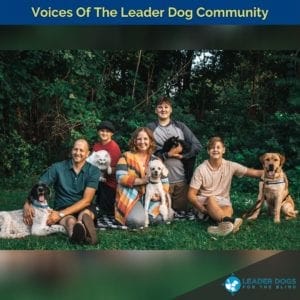 “My wish for 2021 is that my family stays healthy and able to serve others in our community. 2020 has taught us to work together as a family unit, and that we are more than capable of lending a hand (or paw!) when needed and can adapt to major changes. Since change leads to growth, we hope to “grow” by one more family member by raising Future Leader Dog #10 and continue to support the valuable mission of independence and mobility for those who are blind or visually impaired.”
“My wish for 2021 is that my family stays healthy and able to serve others in our community. 2020 has taught us to work together as a family unit, and that we are more than capable of lending a hand (or paw!) when needed and can adapt to major changes. Since change leads to growth, we hope to “grow” by one more family member by raising Future Leader Dog #10 and continue to support the valuable mission of independence and mobility for those who are blind or visually impaired.”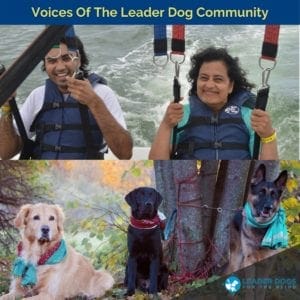 “My 2021 wishes are: 1. To be able to smile while flying, and 2. Have the ones I love close with party clothes and excitement! Have a wonderful Holiday Season filled with all the joy it brings!”
“My 2021 wishes are: 1. To be able to smile while flying, and 2. Have the ones I love close with party clothes and excitement! Have a wonderful Holiday Season filled with all the joy it brings!”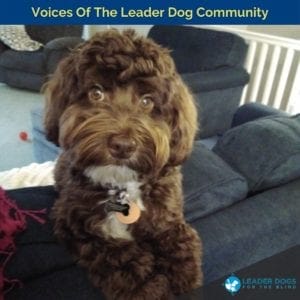 My second wish is selfish. My hope is to get my almost one-year old puppy certified as a therapy dog. She’s very smart, very energetic and loves people. I think she has a sixth sense when it comes to people’s needs and I’m told by trainers that she seems to have what it takes to become a therapy dog. We are working together toward that goal so she can become a comfort to others like she is to me. I am not a trainer, so I need all the help I can get when it comes to helping her to focus and attain what is needed to reach our goal. It may take a little longer, but I believe we can get it done!”
My second wish is selfish. My hope is to get my almost one-year old puppy certified as a therapy dog. She’s very smart, very energetic and loves people. I think she has a sixth sense when it comes to people’s needs and I’m told by trainers that she seems to have what it takes to become a therapy dog. We are working together toward that goal so she can become a comfort to others like she is to me. I am not a trainer, so I need all the help I can get when it comes to helping her to focus and attain what is needed to reach our goal. It may take a little longer, but I believe we can get it done!”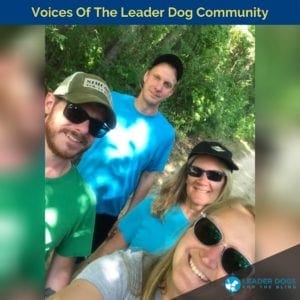 Let’s finish those old projects, start new hobbies and sometimes just do nothing.
Let’s finish those old projects, start new hobbies and sometimes just do nothing.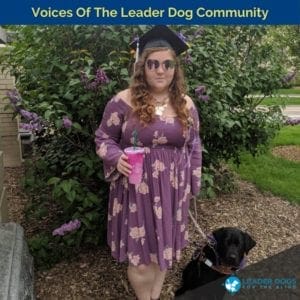 Becoming a guide dog user is the best decision I have ever made, and I am so incredibly grateful to Leader Dog for matching me with such an amazing dog. She has helped me gain a level of independence I never thought I would have and has changed my life. I am excited to be able to share a little bit about my experience with my blindness and my work with disability rights (and a bunch of cute doggo photos as well).
Becoming a guide dog user is the best decision I have ever made, and I am so incredibly grateful to Leader Dog for matching me with such an amazing dog. She has helped me gain a level of independence I never thought I would have and has changed my life. I am excited to be able to share a little bit about my experience with my blindness and my work with disability rights (and a bunch of cute doggo photos as well).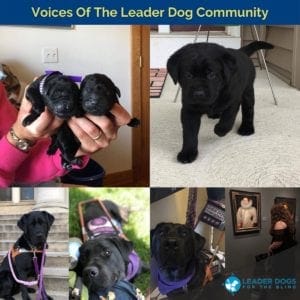 When I decided to apply for a guide dog, there were a couple of things that were really important to me. I wanted a smaller program with a longer training time and more one-on-one instruction, and an organization that focuses on positive reinforcement. Along with that, I wanted an organization that provided ownership rights after graduation. I found all of that in Leader Dog. I am so happy that I chose to apply here, and I am so grateful to have been accepted into this program. Leader Dog really does go above and beyond for their clients. During my time at Leader Dog there was a freak cold front that made it so cold we could not work outside with the dogs. Leader Dog ended up sending me home early, but they flew [Leader Dog] Iris’s instructor out with me to work in my town and the routes I was familiar with. They went above and beyond, and I could not recommend them more to anyone considering applying for a guide dog.
When I decided to apply for a guide dog, there were a couple of things that were really important to me. I wanted a smaller program with a longer training time and more one-on-one instruction, and an organization that focuses on positive reinforcement. Along with that, I wanted an organization that provided ownership rights after graduation. I found all of that in Leader Dog. I am so happy that I chose to apply here, and I am so grateful to have been accepted into this program. Leader Dog really does go above and beyond for their clients. During my time at Leader Dog there was a freak cold front that made it so cold we could not work outside with the dogs. Leader Dog ended up sending me home early, but they flew [Leader Dog] Iris’s instructor out with me to work in my town and the routes I was familiar with. They went above and beyond, and I could not recommend them more to anyone considering applying for a guide dog.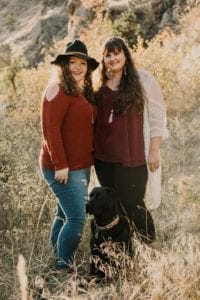
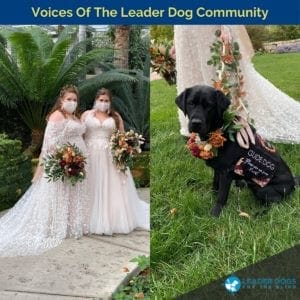 Oppression is multifaceted and, in some situations, incredibly subtle. What is oppressing a group can seem totally fine to individuals in the moment. However, that doesn’t make it fine, and it doesn’t mean disabled people should just sit by and watch it happen. In order to make change its about having the conversation. Autonomy and human dignity are important in disabled people’s existence in the world. As a community we are still incredibly recently deinstitutionalized, with many people still being institutionalized and controlled because of their disability. By reinforcing stereotypes around disabled people being pitiful, helpless creatures, we make it more difficult for our community to fully integrate and live the lives we want independently, autonomously and publicly.
Oppression is multifaceted and, in some situations, incredibly subtle. What is oppressing a group can seem totally fine to individuals in the moment. However, that doesn’t make it fine, and it doesn’t mean disabled people should just sit by and watch it happen. In order to make change its about having the conversation. Autonomy and human dignity are important in disabled people’s existence in the world. As a community we are still incredibly recently deinstitutionalized, with many people still being institutionalized and controlled because of their disability. By reinforcing stereotypes around disabled people being pitiful, helpless creatures, we make it more difficult for our community to fully integrate and live the lives we want independently, autonomously and publicly.